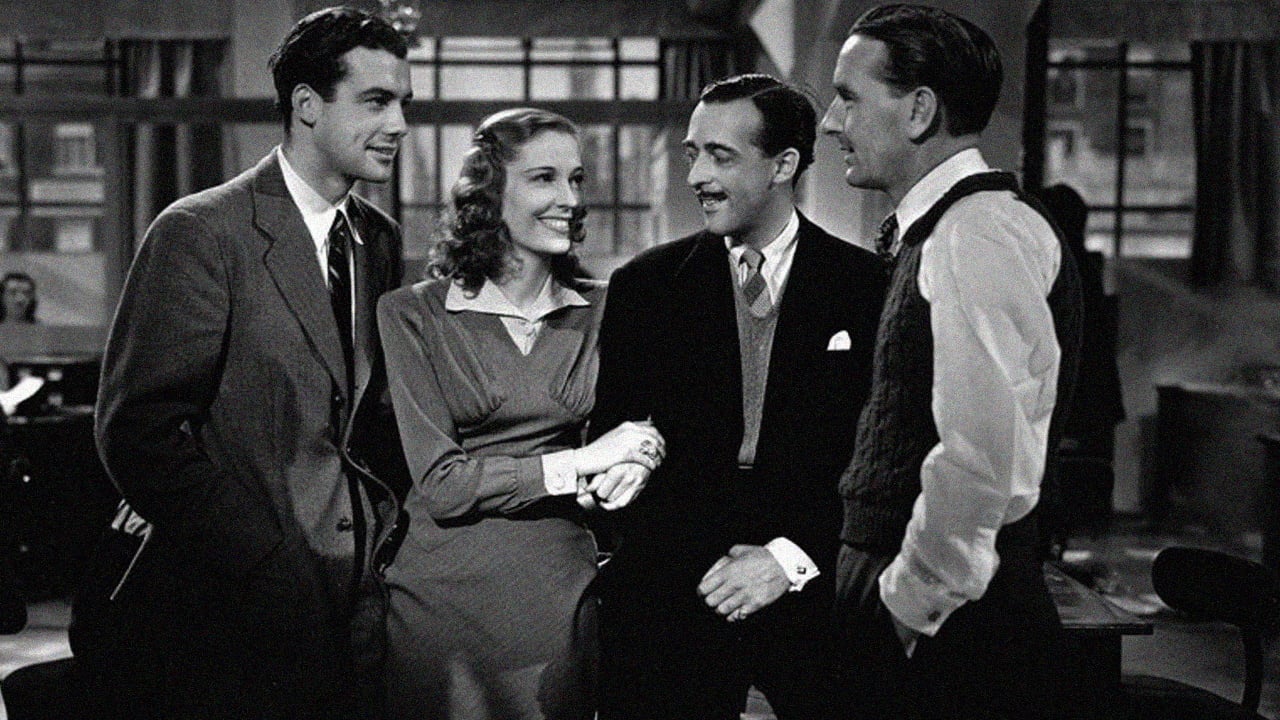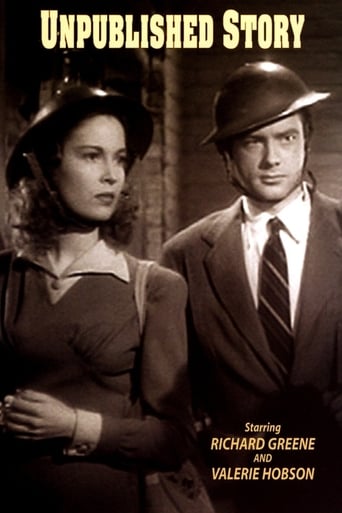

At first rather annoying in its heavy emphasis on reenactments, this movie ultimately proves fascinating, simply because the complicated, highly dramatic tale it tells still almost defies belief.
... View MoreExcellent characters with emotional depth. My wife, daughter and granddaughter all enjoyed it...and me, too! Very good movie! You won't be disappointed.
... View MoreThere are moments in this movie where the great movie it could've been peek out... They're fleeting, here, but they're worth savoring, and they happen often enough to make it worth your while.
... View MoreOne of the film's great tricks is that, for a time, you think it will go down a rabbit hole of unrealistic glorification.
... View MoreUNPUBLISHED STORY is a standard British WW2 propaganda piece; the setting this time is London at the height of the Blitz, in which unsuspecting pedestrians could be devastated by falling bombs without warning. The film is created as a kind of warning against the threat of Fifth Columnists, i.e. Nazi sympathisers, seeking to destabilise society. The worst thing about it is the title, which could be about any boring old thing.This film is rather similar to many others of the era. It's quite snappy and straightforward, not particularly memorable but watchable enough for the time. They always seem to assemble a decent cast in these pictures and so it is the case here. Valerie Hobson, noted for her Universal horror roles, is the dedicated journalist working to expose a German spy ring, and Richard Greene gives solid support as her equal. Basil Radford is reliably fun and the likes of Andre Morell and Miles Malleson show up in support. The film is quite good without being brilliant, and serves its purpose well enough.
... View MoreThe British wartime authorities' perennial obsession with fifth columnists ('enemy agents' were serving as baddies as early as the 1940 George Formby vehicle 'Let George Do It!') here finds elaborate expression in an ambitious production set in London during the Blitz. It took five credited writers to concoct this frequently hard to follow propaganda piece in which actual footage from the Blitz is adroitly combined with recreated studio footage. Censorship is benignly depicted as an essential part of the war effort (hence the title), while a pacifist organisation called 'People for Peace' is revealed to be not simply a Nazi front organisation run by British reactionaries but headed by authentic German 'sleepers' who privately converse among themselves in German. (With acts of terrorism in Europe by refugees from the Middle East now becoming almost everyday occurrences, the sequence depicting the arrival of a German agent masquerading as a Belgian refugee has disturbing contemporary resonances.)Richard Greene and Valerie Hobson are colourless leads, and dependable supporting actors like Basil Radford, Roland Culver and André Morell are generally given remarkably little to do; with the notable exception of Brefni O'Rorke as the editor of 'The Gazette', the newspaper the plot revolves around, who gets to deliver the film's stirring final speech at the fadeout.
... View MoreOne of the films made by Two Cities Films in the 1940s and 1950s, this is a mostly, well-done story of newspaper reporters running into fifth-columnists within their midst in Britain during WW II. The editor of the paper and some other characters say some silly lines, but they can be overlooked. Richard Greene, Valerie Hobson, and Basil Radford star in this predictable spy thriller, showing the realities of bombed out London, although much of it is a background screen projection. The plot brings up the usual "Do we fight back or acquiesce?" wartime debate.Hobson had played Elizabeth in Bride of Frankenstein with the master B. Karloff in 1935. Greene was Sir Henry Baskerville opposite Basil Rathbone prior to "Unpublished...", and would later play Robin Hood in the British TV series for several years. Two Cities Films was part by the Rank Organization, which made films for many years. The Rank Organization would later be turned into a casino operator, which is still operating as a public company in England. Another interesting tidbit is Hobson's marriage to producer/writer Anthoney Havelock-Allen; she appears to have met and married him in 1939, and made nine films together. Sadly, they divorced in 1952, and she only made a couple more films after that...
... View MoreThis is a superior early wartime 'message picture' containing a great deal of real footage of the London Blitz, not all of which I recognised. Richard Greene and Valerie Hobson play two journalists working for the newspaper, the London Gazette, and much of the film takes place in the newsroom. The film's plot largely concerns a British 'peace society' which has been heavily infiltrated by Nazi agents. Anyone who doubts that that is how things worked with the Nazis has only to read the two books INSIDE THE GESTAPO and INSIDE INFORMATION by the high-ranking Gestapo defector (who reported directly to Heydrich) Hansjuergen Koehler to get the true picture. That is precisely how the Gestapo used the 'peace societies', as fronts for espionage and subversion. The Soviet Union did the same thing. It is such a standard and obvious technique that it is a wonder that anyone is left who does not see it clearly, but there are always fools aplenty. This film's message is thus very direct, but also very correct. It is warning the British public not only about appeasers, which abounded in Britain (Neville Chamberlain being the most prominent!), but about the woolly-headed idealists pursuing 'peace', which simply cannot be done with people like the Nazis. (See Dame Flora Robson's amazing performance in GUNS AT BATASI, 1964, for perhaps the best portrayal of a 'peace junkie' out of her depth.) There are numerous old faithfuls in the supporting cast, Basil Radford as a good buy, Roland Culver as a bad guy, Andre Morrell as a Gestapo agent, Frederick Cooper as a 'peace junkie' who discovers he has been manipulated by the Nazis and who then is to be seen pouring more sweat from terror than if he had been under twenty arc lights, and plenty of other excellent character actors. The film is well directed by Harold French, one of the directors of the three excellent Somerset Maugham anthologies (QUARTET, TRIO, and ENCORE), and who lived to be 100 years old (1897-1997)! Strange to think the last feature film he directed was in 1955 (THE MAN WHO LOVED REDHEADS with Moira Shearer) and that he then lived another 42 years. I wonder what he was doing. The film is based on a story by its producer, Anthony Havelock-Allan, famous for producing David Lean's BRIEF ENCOUNTER (for which he was uncredited), Lean's GREAT EXPECTATIONS, Lean's RYAN'S DAUGHTER, Franco Zeffirelli's ROMEO AND JULIET, and many more. He died in 2003, just before turning 99. So between them, the producer and the director of this film lived for just under 200 years. What were they taking? Maybe if we all watch this film 100 times we will all live forever.
... View More